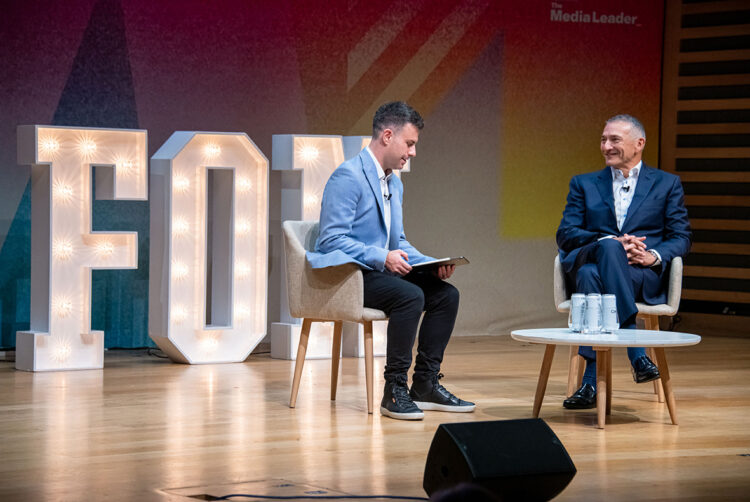The Future of Media London
Stephen Miron, who will leave Global next March after 16 years as CEO, was frank about the start of the company in 2008: “Do we have any idea what we were walking into? Probably not. The radio industry had been in decline for 10 years prior to that.”
According to Miron, Global’s founder and executive president Ashley Tabor-King had an ambition of starting a radio business via consolidations, beginning with Heart and Capital.
Global has since gone from a £250m business in 2008 to now being “just under £1bn”.
For Miron, it’s down to “amazing bravery, incredible teamwork and a bit of luck”, but he reserved the biggest praise for his (soon-to-be former) boss, whom he described as “very persuasive” and “unbelievably committed”.
But of course Miron himself has been credited with much of Global’s success and is perhaps just as synonymous with the company as Tabor-King.
At the start of his headline interview with The Media Leader editor-in-chief Omar Oakes at The Future of Media London, a roll call of familiar names discussed Miron’s networking powers and operational prowess in a slick video. These included well-known industry figures such as ITV CEO Dame Carolyn McCall, Meta’s head of Global Business Group Nicola Mendelsohn and BBC director-general Tim Davie.
Press upstart
Miron once thought he would be in newspapers for his entire career. During two stints at Daily Mail and General Trust (DMGT), he was credited with launching a website for the Daily Mail — the genesis of MailOnline, now one of the world’s biggest news sites — and coming up with the idea of Metro following a trip to Sweden with Lord Rothermere.
The newspaper world was a tough environment that Miron said encouraged “resilience and survival”, and these audacious moves marked his time in that industry.
It’s a spirit that Miron brought to Global. He cited two transformational developments that came to define the company: the purchase of The Guardian’s radio business GMG Radio in 2012, and the move into out-of-home (OOH) in 2018.
As a private company, Miron explained, Global has “speed of decision-making” on its side, and he recalled how Bauer, which also wanted to buy GMG Radio, was in talks at The Guardian office and had no idea that “we’d smuggled into the basement”.
Speed was also the operative word in Global’s move to acquire Exterion Media, then the biggest OOH owner in the UK. Global had recognised that “outdoor was ready for consolidation” and, unlike some other media channels, it was missing crucial tech investment outside of market leader JCDecaux.
According to Miron, the team met Exterion on a Wednesday afternoon at Goldman Sachs to discuss the deal and it was completed by Friday afternoon — all during the time when “Ocean [Outdoor] thought they’d bought the business”.
Moving quickly
Another major development under Miron’s tenure was the launch of Dax, the first programmatic audio platform, which Miron described came from asking: “If we carved out the people who listened on IP, what can we do with it?”
Miron was also keen to highlight the Global Academy, which provides training and education on broadcast media technology to 14- to 18-year-olds. Both he and Tabor-King always had an eye on future talent, despite neither of them having gone to university. But that was the culture at Global: “Let’s create a school and let’s write the syllabus!”
For Miron, constant reinvention is important: “You disrupt yourself before someone disrupts you.” Indeed, he described the maxim at Global as simply: “Is it the right strategic move? Let’s do it.”
Change has been a constant during his time at Global and it’s something he had to navigate as a leader. As he said of himself: “I’m not afraid of confrontation; I never have been.”
That includes his stance on hybrid working that will perhaps prove controversial to some. Miron believes employees should work in the office as much as possible, because “you cannot do your best work on a Zoom call”.
He also described the “responsibility” that businesses have to their people to provide an environment where they continue to learn and suggested that more companies will “push much harder” for a fuller return to the office.
Miron added: “If you want an easy life, it’s lovely being at home.”
He certainly seems like a man who enjoys the fight. So why leave now?
“You have to know when to exit stage left,” Miron said. “It’s been the most amazing journey in these 16 years, but I also think the business needs different thinking in the next 15 years.”
His biggest lesson in this past decade and a half? “Back yourself.”
5 Stephen Miron quotes on good leadership
>> “Know your stuff and be confident about it.”
>> “It’s always about talent — if you’re a CEO, you’re only as good as the people in your organisation.”
>> “You can never take it for granted; you can never be complacent.”
>> “You can have all the technical know-how, but you need relationships. AI is not going to replace those.”
>> “Stop being afraid of what can go wrong and focus on what can go right.”
Adwanted UK is the trusted delivery partner for three essential services which deliver accountability, standardisation, and audience data for the out-of-home industry.
Playout is Outsmart’s new system to centralise and standardise playout reporting data across all outdoor media owners in the UK.
SPACE is the industry’s comprehensive inventory database delivered through a collaboration between IPAO and Outsmart.
The RouteAPI is a SaaS solution which delivers the ooh industry’s audience data quickly and simply into clients’ systems.
Contact us for more information on SPACE, J-ET, Audiotrack or our data engines.





